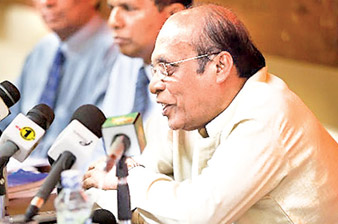|
Spotlight on financial mismanagement:
Wrong to say all state institutions are loss-making - D.E.W.
By Manjula Fernando
Out of 72 public enterprises, fifteen were running at a loss in 2011,
the latest COPE report highlighted.
The Chairman of the Committee on Public Enterprises (COPE), Minister
D.E.W. Gunasekera told Parliament tabling the final report, there was a
notion in the country that all state owned commercial enterprises were
running at a loss but their findings were to the contrary.
|

Minister D.E.W. Gunasekera at the press conference |
However, it was disturbing that four institutions accounted for 98
per cent of the total loss incurred by state institutions in 2011,
namely the Ceylon Petroleum Corporation, Ceylon Electricity Board, Sri
Lankan Airlines and Mihin Lanka Ltd.
Minister Gunasekera told Parliament that the Committee will
concentrated more on loss-making enterprises in the future, to turn them
into profit-making ventures, that would certainly involve unpopular
recommendations.
According to the report nine institutions performed well and recorded
profits in 2011 over losses in 2010. They include the Associated
Newspapers of Ceylon Ltd., the National Water Supply and Drainage Board,
the Sri Lanka Ports Authority, the Paddy Marketing Board, Sri Lanka Tea
Board and Urban Development Authority (UDA).
Meanwhile, 12 institutions which recorded profits in 2010 turned to
loss-making or increased losses in 2011. These include the Ceylon
Fisheries Corporation, MILCO, Lanka Salu Sala, Kantale Sugar Industries,
State Plantation Corporation.
The Board of Investment, Co-operative Wholesale Establishment (CWE),
Employees Trust Fund Board, Lanka Sathosa Ltd., National Savings Bank,
Sri Lanka Insurance Corporation, the SLBC and SPC saw their volume of
profits slump in 2011 as against the previous year.
Among the 14 institutions which recorded continuous losses for the
years 2009, 2010 and 2011 were CPC, Sri Lankan Airlines, Mihin Lanka,
Sri Lanka Transport Board, Lanka Salu Sala and Ceylon Fisheries
Corporation.
The COPE completed examination of 244 state institutions, an increase
of 15 institutions from the previous year to file the second report to
parliament. On October 25 2012, an interim report which recorded 32
institutions was tabled.
In the Chairman's note of the report Senior Minister Gunasekera
stated, " I believe that this exercise is an unprecedented and
distinguished record in the history of our legislature".
He has drawn the attention of the executive to the need for enhancing
the quality of leadership of the public enterprises through the
appointment of professional experienced and skilled personnel who are
both answerable and accountable to salvage the under performing and
loss-making ventures.
It has been emphasised that maximum degree of autonomy and minimum
degree of interference was vital for their performance.
It has also been reiterated that, Treasury and the Public
Administration Ministry must give strong attention to offer better
salaries to Accountants to address the dearth of professionals in this
sector while underscoring the need to move to a 'higher level' of
accounting and auditing to take the state sector to a higher elevation.
Under general observations and recommendations which has 15 in total,
the COPE report underscores the need for the increase in salaries of
professionals in the public sector so as to recruit and retain the best.
The Treasury and the Public Administration Ministry has been required to
take immediate action.
Among other recommendations it has highlighted, appointment of
private auditors, do away with improper financial planning which means
not to compromise on national interest when in a highly competitive
business environment and strengthening internal audit.
The report has directed as a solution to unsatisfactory debt
management, to institute a special debt collecting unit in each
institution to recover the debts without delay.
As for the institutions like SLTB the committee has recommended a
Voluntary Retirement Scheme observing that losses incurred by such
institutions were mainly due to excess staff. It has also recommended
liquidation of certain redundant institutions like the Lakdiva
Engineering Company Ltd., a company engaged in repairing and
manufacturing of bodies of buses for SLTB.
The Report has listed a total of eight such institutions that needs
to be wound up - Janatha Fertilizer Enterprises Ltd., Kantale and
Hingurana Sugar Industries Ltd., Sri Lanka Rubber Manufacturing Export
Corporation Ltd., Lanka Salu Sala Ltd., Lanka Fabrics Ltd., Cooperative
wholesale Establishment and State Trading Wholesale Company Ltd.
The report criticised the operations of certain subsidiary companies
that have gone beyond the control of the parental company reiterating
the need to amend the Parliamentary standing orders to empower Auditor
General to undertake audit of their accounts and to bring them under the
purview of the COPE.
Among other recommendations highlighted were, the need to - address
the dearth of qualified Actuaries, shifting to cost accounting system,
maintain a cordial rapport with trade union leaders to run the
institution smoothly and presentation of annual reports in parliament.
A total of 31 state institutions in 2009 and 48 institutions in 2010
have not tabled their annual reports in parliament as of June 30 this
year. The Committee also made recommendations to increase its
effectiveness taking on board the opposition concerns.
Among these directives are publication of COPE findings every three
months, an annual debate within a month of the publication of the final
report, announce the institutions listed for COPE scrutiny one month
before. In addition there will be a sub-committee headed by COPE
Chairman and representing at least one member from each political party
in the House mainly to identify state institutions for scrutiny and
grade them by losses incurred, strategic importance to the country.
Other recommendations include on the spot inspections and
investigations, and follow up action to monitor if their recommendations
have brought in intended results.
The three subcommittees of COPE were headed by Minister Susil
Premajayantha, Member of Parliament Karu Jayasuriya and Deputy Minister
Lasantha Alagiyawanna. |


